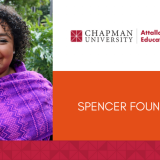
Mental Wellth Project Expands Free, Online Resources New Mental Health in Schools Toolkits and Mental Health Disorder Resources added for educators, youth, and parents.
January 27, 2022
Chapman University’s Mental Wellth Project has added new online toolkits and materials to its Mental Health in Schools resource hub.
The Mental Wellth Project website includes free, downloadable mental health resources for parents, educators, and school-age kids developed by Chapman School Counseling and School Psychology (CSP) graduate students. Recent additions to the site this year include new Mental Health in Schools Toolkits and mental health disorder one-page handouts and videos. All Mental Wellth resources are customized by audience (educators, parents, and children) and grade level and are available free of charge.
Since its launch in 2020, the project has sought to help parents and educators gain a better understanding of mental health, while also providing them with resources to better support their students’ success, in the classroom and beyond.
Mental Wellth Project
Initially developed in Fall 2020 by Amy Jane Griffiths, Ph.D., NCSP, Assistant Professor of School Counseling, and Zack Maupin, Ph.D., the Mental Wellth Project was designed as a way for students in the M.A. in School Counseling and Ed.S. in School Psychology graduate programs to take what they learned in class — mental wellness resources, statistics, study findings, and more — and share it with a larger audience. The project helped the CSP students in their CSP 517: Mental Health in Schools course connect their coursework to practice.
Dr. Maupin said they continued the project in the Fall 2021 CSP 517 course because it offers future counselors and school psychologists an opportunity to collaborate across disciplines.
“Working on the mental health toolkits and resources this semester provided a realistic opportunity for our students to work as a team and develop relevant tools that they can all utilize in our respective fields,” said Dr. Maupin. “It also offered valuable insight into how mental health can be promoted within schools.”
New Toolkits
Organized by grade level and audience, resources on the Mental Wellth Project webpage were crafted for youth and busy educators and parents.
The page includes full toolkits with infographics, activities, and links to online resources. While some of the toolkits were written for the students themselves, others are guides for educators and parents that were designed to help them become better equipped to support their students’ mental health:
- Young children
- Adolescents (new in 2022)
- High school students
- Elementary educators (new in 2022)
- Secondary educators
- Parents (all ages)
- High School parents (new in 2022)
The site also includes worksheets with tips and tools specific to distance and home-based learning and other pandemic related causes of stress and isolation.
“A lot of parents and educators are looking for mental health resources, especially during these times,” said Emily Drinkwine, second-year student in the Ed.S. in School Psychology and Licensed Professional Clinical Counselor (LPCC) programs, and a 2021–2022 Warne Scholar. “The Mental Well project also gives us tools that we can apply in our practice. This is a resource that I will continue to use throughout my career.”
Mental Health Disorders
Also new in 2022 is a set of mental health disorder one-page handouts and videos. The handouts give a general overview of each disorder and how it is addressed in school settings:
- Conduct and Oppositional Defiant Disorders
- Feeding and Eating Disorder
- Generalized Anxiety and Obsessive Compulsive Disorders
- Major Depressive and Bipolar Disorders
- Neurodevelopmental Disorders (with a focus on ADHD)
- Schizophrenia Spectrum Disorder
Each handout is accompanied by a short, recorded video presentation.
Dr. Maupin explained preparing the mental disorder handouts and presentations offered his students valuable practice communicating complex medical information to the communities they serve in jargon-free language.
“As future practitioners, it will be their responsibility recognize signs and symptoms of mental health disorders to support students with individualized needs,” he said. “In doing so, they can also help reduce the stigma around mental health challenges and promote school and community-based resources.”
Joshua Cheng, a first-year MA in School Counseling student, said he enjoyed how the school counseling and school psychology students worked together to produce the project materials: “Together we created an outstanding resource that I am proud to place in my future job application portfolio.”
For more information about Chapman University’s graduate-level mental health in school programs, visit the M.A. in School Counseling, Ed.S. in School Psychology, and Licensed Professional Clinical Counselor (LPCC) program webpages.

